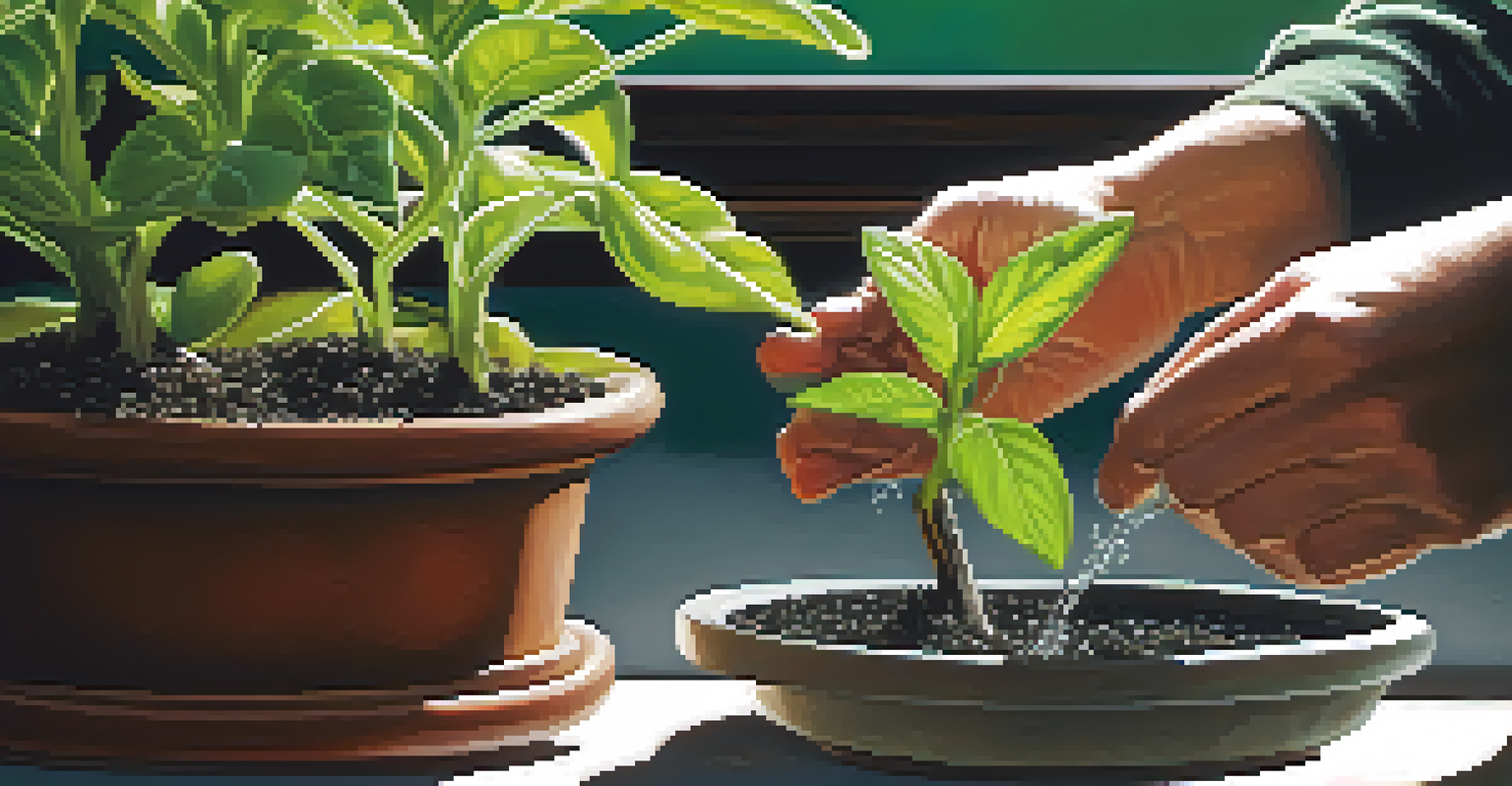Plants and Mindfulness: A Path to Mental Wellness

Understanding the Connection Between Plants and Mindfulness
Mindfulness is the practice of being present in the moment, and when combined with the soothing presence of plants, it can enhance our mental well-being. Research shows that interacting with nature can reduce stress and anxiety, making it a powerful ally in our busy lives. Plants not only beautify our spaces but also promote a sense of calm and grounding.
The clearest way into the Universe is through a forest wilderness.
By incorporating plants into our mindfulness practices, we can create a serene atmosphere that encourages relaxation and reflection. For example, taking a few moments to observe a plant's intricate details can shift our focus away from worries and into the present. This connection to nature fosters a deeper awareness of our thoughts and feelings.
Moreover, caring for plants can serve as a form of mindfulness itself. The act of watering, pruning, or simply admiring a plant can draw us into a meditative state, allowing us to leave behind the chaos of daily life. In this way, plants become not just decor, but vital companions in our journey to mental wellness.
The Benefits of Indoor Plants for Mental Health
Indoor plants are more than just pretty additions to our homes; they can significantly boost our mental health. Studies have shown that having plants indoors can lower stress levels, improve mood, and even enhance cognitive function. The mere sight of greenery can evoke feelings of tranquility and happiness.

For instance, a simple desk plant can help create a more inviting workspace, reducing feelings of fatigue and promoting productivity. By bringing the essence of nature indoors, we can cultivate a space that encourages focus and creativity. This is particularly beneficial in today’s remote working environment where a personal touch can make all the difference.
Plants Enhance Mindfulness Practices
Incorporating plants into mindfulness routines promotes relaxation and helps ground our thoughts in the present moment.
Additionally, plants can improve air quality, which in turn affects our overall well-being. Cleaner air translates to clearer minds, making it easier to concentrate and feel energized. Thus, incorporating indoor plants into our living and working spaces serves dual purposes: enhancing aesthetics and nurturing mental health.
Mindful Practices to Engage with Your Plants
Engaging mindfully with plants can transform the way we experience them. One simple practice is to set aside time each day to simply observe your plants. Take a moment to notice the colors, textures, and shapes, allowing yourself to be fully immersed in the sensory experience. This practice can ground us and promote a sense of calm.
To plant a garden is to believe in tomorrow.
Another mindful method is to care for your plants with intention. Rather than rushing through watering or pruning, consider making it a ritual. Feel the soil, listen to the sounds of nature outside, and appreciate the life you are nurturing. This intentionality can help reinforce your connection to both the plants and your own mental state.
Journaling about your experiences with your plants can also be a powerful tool. Write about your observations, feelings, and thoughts during these mindful moments. This not only deepens your understanding of your plants but also helps clarify your own emotions, reinforcing the therapeutic relationship between you and nature.
Creating a Mindfulness Garden at Home
Creating a mindfulness garden can provide a dedicated space for reflection and tranquility. Whether you have a sprawling backyard or a small balcony, you can design a garden that aligns with your personal wellness goals. Incorporating a variety of plants can stimulate your senses and create a peaceful retreat in your home.
Consider including fragrant herbs, colorful flowers, and textured foliage to engage multiple senses. Each plant can evoke different feelings and memories, making your garden a personal sanctuary. Spending time in this space can serve as a reminder to pause, breathe, and reconnect with yourself.
Indoor Plants Boost Mental Health
Having indoor plants can significantly lower stress levels, improve mood, and enhance cognitive function.
Additionally, you can enhance your mindfulness garden with seating areas or pathways that encourage slow, deliberate movement. Using natural materials and arranging plants thoughtfully can create an inviting atmosphere. This garden becomes not just a collection of plants, but a living embodiment of your mindfulness journey.
Incorporating Nature into Daily Mindfulness Practices
Incorporating nature into your daily mindfulness practices can dramatically enhance their effectiveness. For example, you can start your day by taking a few moments to sit near your plants, breathing deeply and observing their beauty. This can set a positive tone for the day ahead, cultivating a sense of gratitude and peace.
Additionally, consider mindful walking in nature as a complement to your indoor practices. Spending time outdoors, surrounded by greenery, allows for a deeper connection to the natural world. You can practice walking meditation, focusing on each step while immersing yourself in the sights and sounds around you.
Combining these practices can lead to a more holistic approach to mental wellness. By alternating between indoor mindfulness with your plants and outdoor experiences in nature, you create a balanced routine that nurtures both your mind and spirit. This synergy amplifies the benefits of mindfulness, leading to lasting mental health improvements.
The Science Behind Plants and Stress Reduction
Research has consistently highlighted the positive effects of plants on stress reduction. Studies show that spending time with plants can lower cortisol levels, the hormone primarily responsible for stress. This physiological response can lead to improved mood and overall mental clarity, making plants valuable allies in our quest for tranquility.
Furthermore, green spaces have been linked to lower levels of anxiety and depression. The presence of plants can elicit feelings of safety and comfort, allowing us to feel more at ease in our environments. This is particularly relevant in urban areas where green spaces might be limited.
Creating a Mindfulness Garden
Designing a mindfulness garden provides a tranquil space for reflection, allowing for a deeper connection with nature.
By understanding the science behind this phenomenon, we can better appreciate the role plants play in our mental wellness. It’s not just about aesthetics; it’s about creating environments that foster peace and resilience. Integrating plants into our lives can be a straightforward yet effective strategy for managing stress.
Building a Routine with Plants for Mental Wellness
Establishing a routine that incorporates plants can significantly enhance your mental well-being. Whether it’s watering your plants each morning or taking time in the evening to tend to them, these small rituals can create a sense of stability and purpose. Consistency in these activities fosters a deeper connection with your plants and enhances the calming effects they provide.
Consider setting reminders for daily plant care or mindful observation. This can help cultivate a habit of connecting with nature, even in a busy schedule. Over time, these moments can become a cherished part of your day, offering a sanctuary from the hustle and bustle of life.

Lastly, don’t forget to celebrate your plants’ growth and milestones. Taking note of new leaves or blooms can deepen your appreciation for the life around you. These moments of joy not only brighten your day but also reinforce the positive relationship you have with nature, ultimately supporting your mental wellness.